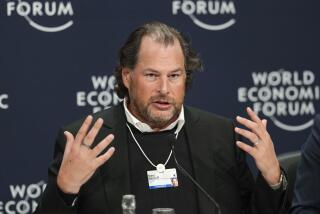Insider Stock Selling Up 12% in ‘99, to $42.3 Billion
- Share via
NEW YORK — U.S. executives boosted their stock sales by 12% to $42.3 billion in 1999, led for the fourth year in a row by Microsoft Corp. officers, according to the Washington Service research firm.
The amount of selling, particularly among technology officers, was restrained in 1999 given the 86% surge in the Nasdaq composite index and the 25% rise in the Dow Jones industrial average, analysts said. In fact, the increase in the total value of sales was the smallest since 1994.
“The figures are bullish,” said Bob Gabele, editor of First Call/Thomson Financial’s Insiders’ Chronicle newsletter.
Microsoft Chairman Bill Gates, the world’s richest man, led all executives with $2.5 billion in sales as the software maker’s shares rose about 70% for the year. Microsoft officers accounted for a 10th of total sales, Washington Service said.
So-called insiders--executives, directors and big individual investors--purchased $3.6 billion in shares during the year, a 15% increase from the prior year.
The largest buyers were from health-care and insurance companies, including Columbia/HCA Healthcare Corp. Chief Executive Thomas Frist Jr.
Overall, “there continue to be very aggressive rates of buying” relative to sales, said David Coleman, editor of Vickers Weekly Insider Report, which tracks buying and selling by executives.
Over the last two months there have been three purchases by insiders for every two sales, Vickers said.
Insider purchases picked up in the second half of the year, as stocks of financial services and other companies fell after the Federal Reserve Board raised short-term interest rates. The buying has held up even as the Dow Jones industrial average rebounded--auguring well for stocks, analysts say, because it suggests insiders are bullish on their companies’ outlooks.
Typically, the total level of insider selling is always much greater than their open-market purchases of stock, because executives get much of their stock via options. Those options also account for much of their total compensation, so selling is expected as they take profits to fund their lifestyles.
Indeed, persistent selling doesn’t mean a stock is headed for a fall, because executives may have many reasons to sell--such as to finance a home purchase or diversify their investments.
Technology companies typically record the highest level of insider selling, because those companies heavily use stock options, rather than big salaries, to compensate many employees.
What’s more, billion-dollar sales seem puny compared to the booming values of software, networking and Internet stocks, analysts said.
“Take it with a grain of salt,” said Standard & Poor’s Corp. analyst Megan Graham-Hackett, pointing out that many such sales come before the shares peak.
Insiders at Microsoft sold $4.3 billion in shares, more than twice as much as any other company. Dell Computer Corp. insiders sold $2.1 billion in shares, while America Online Inc. officers ranked third with $854 million.
The biggest individual sellers included Gates, Dell Chairman Michael Dell, who sold $1.6 billion in shares, and Microsoft co-founder and director Paul Allen, with $1.3 billion.
Microsoft said Gates regularly sells shares to diversify his investments as well as for charitable giving. America Online and Dell said their chiefs regularly sell shares, which are small compared with their overall holdings. Dell’s stock has gained 42% this year while America Online has more than doubled.
The biggest single buyers this year were at AMFM Inc., one of the largest radio broadcasters. Buyout firm Hicks, Muse, Tate & Furst Inc. increased its stake by buying $377 million in stock. AMFM, which is being bought by rival Clear Channel Communications Inc., has risen 62% this year.
In the health-care industry, insiders purchased large holdings at Columbia/HCA, Apria Healthcare Group Inc. and Tenet Healthcare Corp. At Columbia/HCA, Frist’s purchases came as the shares had lost almost half their value since February 1997 on concern about a federal investigation.
The purchases are “a very positive sign for the long-term fundamentals of the industry,” said Matthew Ripperger, analyst with Warburg Dillon Read Inc.
But insider purchases don’t always pay off in the short run.
Officers and directors at insurance company Conseco Inc. bought $130 million in stock, led by CEO Stephen Hilbert’s $47 million. Conseco shares trade at less than a third of the level of April 1998.
Executives have purchased 16 million shares since 1996 under a program in which Conseco guarantees bank loans for purchases.
Executives of Dole Food Co. and Chiquita Brands International Inc. made large purchases. Their shares have each lost almost half their value this year because of lower prices for the fruit in Europe.
(BEGIN TEXT OF INFOBOX / INFOGRAPHIC)
Insider Trading
The annual value, as of Monday, of shares sold and bought by U.S. corporate executives and other insiders during the 1990s:
*--*
Total Total selling 1 yr. buying 1 yr. Year (billions) % chg. (billions) % chg. ’90 $3.48 5% $0.95 36% ’91 9.40 170 0.68 28 ’92 12.09 29 1.07 59 ’93 13.08 8 1.75 63 ’94 11.03 16 1.75 1 ’95 15.33 39 1.44 18 ’96 25.11 64 2.25 57 ’97 28.87 15 2.28 1 ’98 37.85 31 3.16 39 ’99 42.33 12 3.64 15
*--*
Source: Washington Service
More to Read
Inside the business of entertainment
The Wide Shot brings you news, analysis and insights on everything from streaming wars to production — and what it all means for the future.
You may occasionally receive promotional content from the Los Angeles Times.










